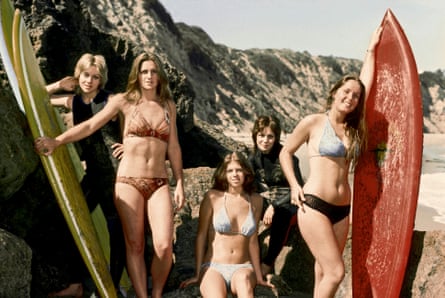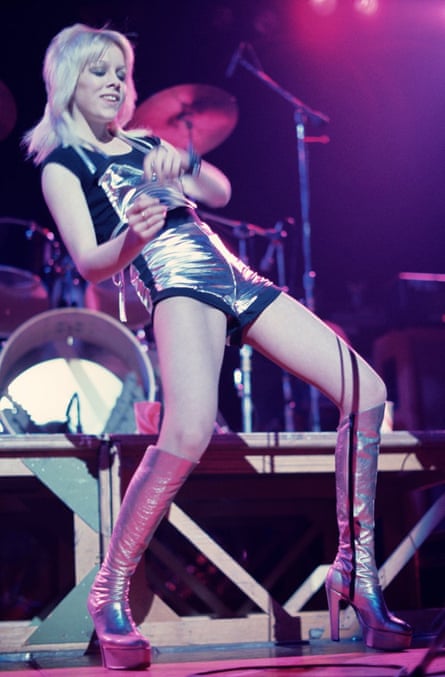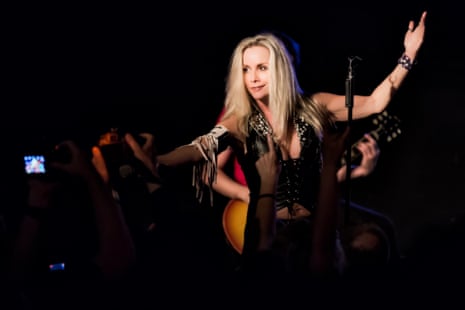The teenage patients in the substance abuse ward of North Hollywood’s Coldwater Canyon hospital may not have been aware of the past life of their counsellor. If they weren’t, they were missing out on quite the kick.
At 16, Cherie Currie had prowled world stages in the Runaways, the 70s all-girl rock band that bowled out of the Sunset Strip, toppling tired teenage groupies in their wake. Trussed up in a corset, and snarling about being your ch-ch-ch-cherry bomb over fierce riffs, Currie was pregnant by one manager and allegedly emotionally abused by another.
Currie had been the original Valley girl, a surfie chick living in her more popular twin sister’s shadow, and trying to contend with the sudden absence of her mother, who had moved to Indonesia to follow a new romance.
At 15, following an alleged rape and having hacked off all her hair, Bowie-style – to escape, like him, into an alter ego – Currie was recruited by Svengali manager Kim Fowley. He thought her tough facade made her the perfect frontwoman for a band shaped by his comic-schlock lyrics and bubblegum bravado. To maintain that edge, she says, he pitted the bandmates against each other.
“We just never had a break,” Currie recalls, of her stint with Joan Jett, Lita Ford, Sandy West and Jackie Fox. “Either we were touring, rehearsing or in the studio, and we were making no money at all. They were making a lot of money off of us.”
Exhaustion wasn’t all the Runaways had to deal with. Last year, Huffington Post broke the story of the alleged rape of the then-16-year-old Jackie “Fox” Fuchs by Fowley after a New Year’s Eve gig, while she was incapacitated by quaaludes. Fuchs maintains – very eloquently – that this happened in front of Currie and Jett. In countless interviews since, Currie has given her version of events: that she did not witness anything that looked like rape.

By 17, Currie was burned out on cocaine and quaaludes, and quit. Her bad fortune didn’t let up. Two years later, she says, she was kidnapped and raped by a stalker who had previously murdered six women in Texas.
It was in the 1980s – having surrendered a nascent movie career to freebase cocaine – that Currie turned her life around and became a tech at Coldwater, working in both the drug and psych facilities. When she graduated to drug and alcohol counsellor it was “to be able to share my experience, strength and hope with other kids.
“I was only 25 and a lot of these kids were the age I was when I was in the Runaways when I was introduced to drugs, so it was a good fit for me.”
It’s not hard to imagine Currie in the role of counsellor – she’s basically your one-woman cheerleader, quite the opposite of the reticent Joan Jett. “I’m a big fan of the Guardian, I’m so glad you guys have a branch in Australia, congratulations,” she says energetically as our call is connected. When I drop in that I wrote a novel with her in mind (come on, you’d drop it in, too), she positively vibrates. “I’m very proud of you. That’s great. Because kids need that kind of thing.”
Her own book, Neon Angel, was originally intended for teenagers. She’d gone to the publisher as an artist, hoping to illustrate children’s books – her actress mother was a good artist and her father was a cartoonist – and she wound up telling the head of the publishing company about her Runaways history. He urged her to write the imprint’s first young adult book, which later became a no-holds-barred adult memoir.
Writing it might have allowed her to wrest back control of traumatic scenes, but when I ask if she’d in fact suffered post-traumatic stress syndrome, she says, “Not any more.
“With Kim in particular, I really turned that around. Instead of dealing with the anger and resentment and even the hatred I had against him, I decided that that only hurt me.”
Currie now juggles three careers as writer (her current project is a play), musician and chainsaw artist, and lives in the picturesque San Fernando Valley. It was there that – to the surprise of everybody, including herself – she wound up caring for her former tormentor Fowley, who was dying of bladder cancer.
“He didn’t do it right,” Currie acknowledges of Fowley’s control of the band. According to Currie, this included giving the underage girls a sex education lesson with a live demonstration. “But he came from an orphanage,” she continues. “He had gone through polio, with no parental guidance of any kind.”
Currie has mentioned her “experience, strength and hope”, which is a telltale expression of Alcoholics Anonymous and Narcotics Anonymous. She’ll happily admit she “did the program hardcore for a number of years. Then I started to see some flaws in the system and graduated into my own spiritual type of the 12 steps.”
The ninth step encourages making amends. A person “clears up their side of the street”, and refrains from casting blame at the other party. It’s designed to promote forgiveness and assuage the sense of guilt, resentment or victimhood that can keep a person using drugs. Currie doesn’t reference this step in our interview, but it’s interesting that she did initiate the ultimate reconciliation, with Fowley.
“We spent countless hours talking through what I went through with him in the Runaways,” she says. “Had I not reached out I would have had a hole in myself the size of a basketball that I would have had to carry with me the rest of my life.”

The Runaways came of age in what rock historians like to call a “permissive era”, when the line between sex and statutory rape, or rape, became ever more blurred. Teenage groupies skipped class to hang at venues such as Rodney Bingenheimer’s English Disco. David Bowie and Led Zeppelin are among those who famously enjoyed this smorgasboard. Underage sex has been openly immortalised by the musicians themselves, such as Iggy Pop who sings in Look Away: “I slept with Sable when she was 13”.
On the one hand, police investigations such as Operation Yewtree are investigating the historical sex crimes of minors by entertainment-industry perpetrators including Rolf Harris, Jimmy Savile and Gary Glitter. On the other hand, Currie tells me, “We have to take responsibility for our actions.”
But what responsibility does she possibly need to take for her teenage self?
“I’ll give you an example of an exercise that I stumbled upon,” she says, “and this is something that I’ve even had friends of mine do, just to show them the power of it. If you turn around and say, ‘I take responsibility for everything that has happened in my life’…” She pauses. “If you just said that, out loud, right now.”
More insistently: “Jenny.”
Dutifully, I repeat it.
She continues, “Do you feel something happening to you? Do you feel your chest opening up? When people refuse to take responsibility for anything, it allows you to continue to use. You’ve got to be a victim to be a drug addict.”
It’s a dicey topic, as she knows well – particularly in the wake of Fuchs’ rape allegation. “I’ve been beat up a lot for taking responsibility for getting in the car of a kidnapper, a murderer,” she admits. “People have come at me with torches. The thing is, that voice in my head told me, ‘Don’t get in that car.’”
She clarifies: “There are people that have no responsibility. I’m talking about when we make a conscious choice, when a part of our brain is saying, nuh-uh, and we choose to ignore it.” And as she’s also told LA’s Juice magazine, women take on rape “like it’s their fault, and it’s not”.
It’s clear that Currie’s dogma has been her route to healing. She’s about to come to Australia for the first time, and she couldn’t be happier about playing the old hits that ought to hold bad memories.
“I never get tired of doing those Runaways songs,” she insists. “My mind is still that young girl up on stage, only a lot wiser. I really enjoy it.”
Before he died, Fowley collaborated with Currie one more time, on her 2015 solo album Reverie – which is as gleefully technicolour as you’d hope it could be. Also contributing was her musician son Jake – from her marriage to actor Robert Hays (who most famously played Striker on Airplane!) – and her old bandmate and nemesis, the fearsome Lita Ford.
Fowley’s lyrics are unmistakable in tracks like Queen of the Asphalt Jungle: “From the fastfood grease pits to the back of a stolen car …” It’s the teenage dream of a man forever locked in arrested development.
“For me, it was the end of a nightmare,” Currie says of her last months with Fowley. “I’m so grateful for that time. People can change. They can. Without him, Joan never would have happened, Lita and myself, so I owe him a great deal and I was very honoured to take care of him towards the end of his life. I would have done it again and again, and I’m sorry that I lost him.”
- Cherie Currie’s New Zealand/Australia tour begins in Auckland on 20 May

Comments (…)
Sign in or create your Guardian account to join the discussion